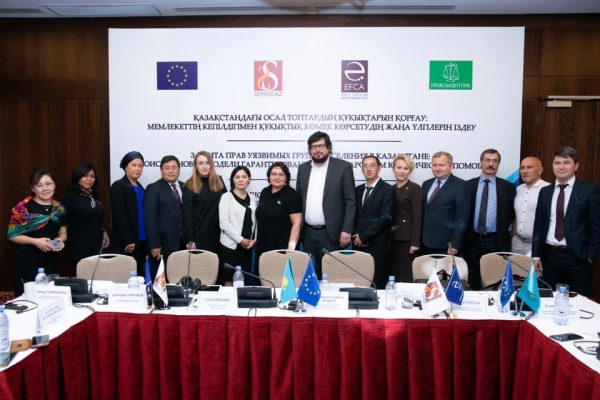
Zhuldyz Smagulova confirmed as the next Chairperson of the Board of Trustees of Soros Foundation-Kazakhstan
28/05/2018
“Bad jokes. On the 70th anniversary of the signing of the Universal Declaration of Human Rights”
06/12/2018ASTANA — On November 2, 2018, the Eurasia Foundation of Central Asia with financial support from the Soros Foundation-Kazakhstan, held a national conference on the topic “Protecting the rights of vulnerable groups in Kazakhstan: in search of a new model of state-guaranteed legal aid”.
This event was organized to summarize the main results of the project “Improving the system of legal aid for vulnerable groups in Kazakhstan” sponsored by the European Union Delegation to the Republic of Kazakhstan, as well as to discuss topical issues in the field of state-guaranteed legal aid. The event was attended by deputies of the Mazhilis of the Republic of Kazakhstan, representatives of the Ministry of Justice, the Ministry of Internal Affairs and other departments, lawyers, as well as representatives of non-governmental organizations (NGOs), international organizations, and experts in the field of human rights.
International law in the field of human rights provides that one of the main elements of the right to access to justice is the right to effective provision of legal aid, including that guaranteed by the state and provided at the expense of the state budget. Moreover, the effectiveness of such assistance should be assessed according to five criteria: quality, accessibility, partnership, sustainability, and focus on the needs of the client.
“Access to guaranteed state legal aid is an important condition for ensuring access to fair justice and the basis for building a legal state. Unfortunately, in our country, not all citizens can go to court and protect their rights, as highlighted by the results of research of this project and many other human rights reports. It is important to understand that building an effective, consolidated, and transparent model for the provision of qualified legal aid, thanks to which each person can realize his constitutional guarantees, is one of the main driving factors for the development of our country”, said Bota Ayazbayev, Acting Director of the Soros-Kazakhstan Foundation Programs.
The project “Improving the system of legal aid for vulnerable groups in Kazakhstan” was aimed at improving the mechanisms and practices of protecting the rights of vulnerable groups of the population, especially if they are involved in the criminal and civil justice system through improving quality and access to the state-guaranteed legal aid.
Among the main results of the project, it is possible to single out large-scale studies in 7 regions of Kazakhstan by target groups (women in difficult life situations, graduates of orphanages, juvenile offenders and people sentenced to imprisonment). According to the results of the research, the main barriers for the above-mentioned groups to accessing the state-guaranteed legal aid were identified and recommendations were made by experts in order to improve national legislation.
“In addition to the research, the project was able to raise public awareness about the mechanisms to obtain the state-guaranteed legal aid, to study and analyze the international experience of Georgia. We believe that it is necessary to improve the quality and availability of state-guaranteed legal aid to vulnerable groups and make it more focused and tailored to their needs. There is also a need to increase the categories of recipients of such assistance under the state-guaranteed legal aid system by reducing the cost of “legal information”, said Rinad Temirbekov, Executive Director of the Eurasia Foundation of Central Asia
The format of the event consisted of a press conference for the media, a national conference and a briefing session for embassies and international organizations, which allowed to cover a wide range of stakeholders taking into account their activities and interests in protecting the rights of vulnerable groups of the population. Thus, during the event, a platform was created to develop a common vision of further steps to improve the SGLA system with the participation of representatives of the public sector, the legal profession, civil society and international organizations.

